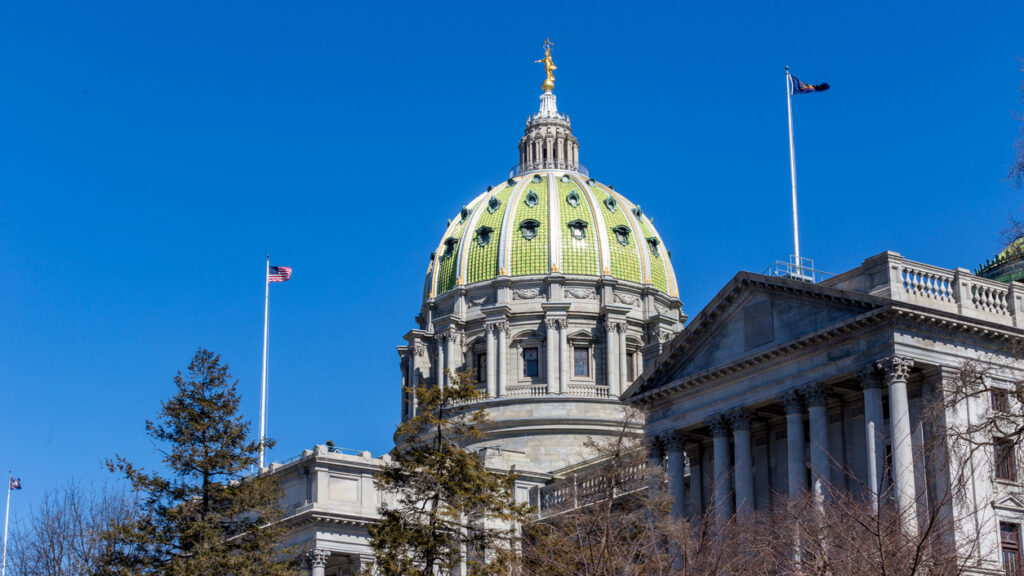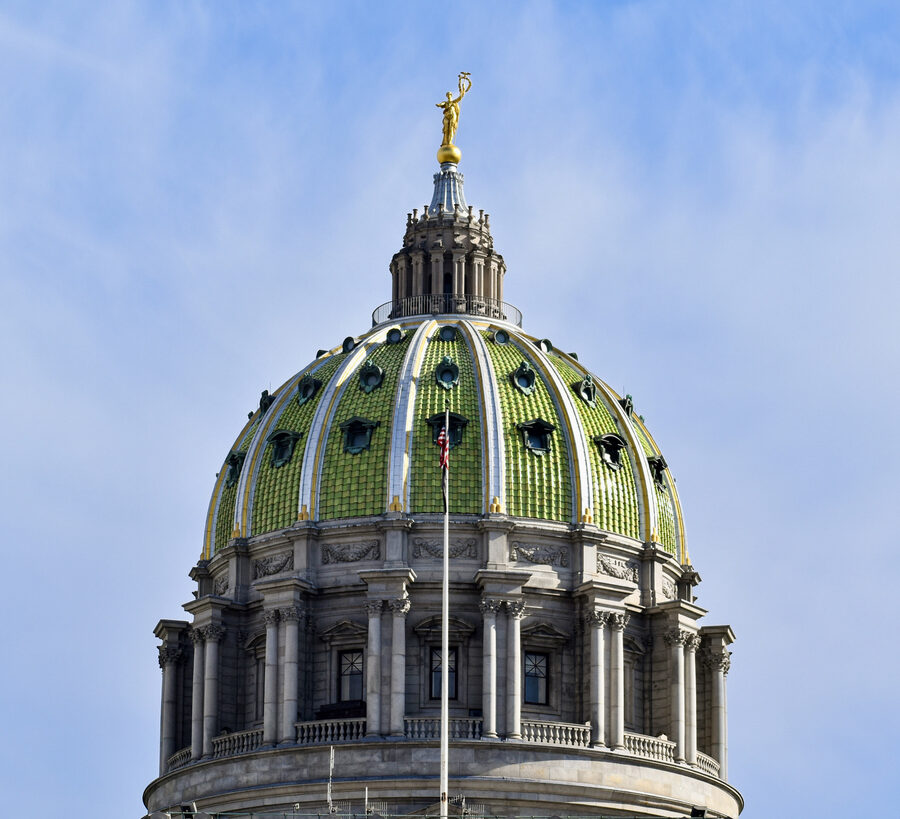Latest Content

Education
Key Takeaways from Governor’s 2024 Budget Proposal
Key Points Gov. Josh Shapiro’s startling spending increases and myriad of new initiatives would explode the budget deficit and invite massive tax hikes on working families in the coming years.
Read More: Key Takeaways from Governor’s 2024 Budget Proposal
Public Union Democracy
Shapiro’s Project Labor Agreement Mandate
Read More: Shapiro’s Project Labor Agreement Mandate
Regulation
Regulatory Reforms Stalled in State House
Read More: Regulatory Reforms Stalled in State House
Public Union Democracy
Paycheck Protection Toolkit
Currently, state and local governments, including school districts, use taxpayer-funded payroll systems and public employee time to collect union campaign contributions as well as union membership dues, a portion of…
Fact Sheet
Read More: Paycheck Protection ToolkitState Budget
A Brief History of Tom Wolf’s Tax Hike Proposals
Since taking office, Gov. Tom Wolf has proposed or supported 10 tax hikes on working families. Lawmakers worked with Wolf to raise taxes in two of the past three years.
Memo
Read More: A Brief History of Tom Wolf’s Tax Hike ProposalsPublic Union Democracy
Ending Taxpayer-Funded Collection of Campaign Contributions
The House State Government Committee recently advanced SB 166, which restores integrity to an unfair system by stopping taxpayer-funded collection and distribution of campaign contributions for any entity. We explain…
Memo
Read More: Ending Taxpayer-Funded Collection of Campaign ContributionsHealth Care
Restoring the Dignity of Work
The benefits of work are widely known. Yet major welfare programs treat work as a burden instead of the pathway to prosperity. Restoring work in food stamps alone could improve…
Report
Read More: Restoring the Dignity of WorkState Budget
What’s Next for the 2017-18 Budget?
What does the Senate's vote to non-concur mean? How does a conference committee work? How does the credit downgrade affect the budget? Negotiations over the 2017-18 budget have raised interesting…
Memo
Read More: What’s Next for the 2017-18 Budget?State Budget
Ten Facts About the Shadow Budget
Four tax hikes in eight years have failed to solve Pennsylvania’s budget challenges or grow the economy. In contrast, utilizing 13% of reserve funds in the shadow budget…
Memo
Read More: Ten Facts About the Shadow BudgetState Budget
Five Facts About the Shadow Budget
Lawmakers should utilize surplus shadow budget funds before raising taxes on working families.
Memo
Read More: Five Facts About the Shadow BudgetHealth Care
Five Medicaid Work Requirement Truths
Work leaves families better off. To ignore this fact and urge people to trust a failing Medicaid system is nothing short of a moral scandal.
Fact Sheet
Read More: Five Medicaid Work Requirement TruthsState Budget
Policy Memo: Analysis of the State Senate’s Revenue Plan
On July 27, the state Senate passed a $1.8 billion revenue package, which includes more than $1.2 billion in borrowing and $570 million in tax increases to pay for the…
Memo
Read More: Policy Memo: Analysis of the State Senate’s Revenue PlanEducation
Policy Memo: Education Savings Accounts: Myths and Facts
Education Savings Accounts help children grow, satisfy parents, and can improve the quality of education in Pennsylvania. This memo addresses falsehoods raised by opponents of parental choice in education.
Memo
Read More: Policy Memo: Education Savings Accounts: Myths and FactsRegulation
Policy Memo: Ideas to Balance the 2017-18 Budget
With a spending plan in place, lawmakers should focus their efforts on reinventing state government to balance the budget, including ending horse racing subsidies.
Memo
Read More: Policy Memo: Ideas to Balance the 2017-18 BudgetTaxes & Economy
Policy Memo: The History of Tom Wolf’s Proposed Tax Hikes
Since assuming office, Gov. Tom Wolf has persistently advocated higher taxes on working Pennsylvania families. Here's a brief history of Wolf's efforts to raise taxes. …
Memo
Read More: Policy Memo: The History of Tom Wolf’s Proposed Tax HikesRegulation
Policy Points: Pennsylvania’s Debt Burden
State and local debt levels have exploded since 2002. When combined with the commonwealth’s unfunded liabilities, total state obligations exceed $17,600 for every Pennsylvania resident.
Fact Sheet
Read More: Policy Points: Pennsylvania’s Debt BurdenCriminal Justice Reform
Policy Memo: Principles for State Budget
With the 2017 budget, lawmakers have an opportunity to double down on the idea of reinventing government and adopt meaningful reforms that will save taxpayers money, stimulate economic growth, and improve services…
Memo
Read More: Policy Memo: Principles for State BudgetRegulation
Policy Memo: Pension Reform in Pennsylvania
Pennsylvania’s $71 billion unfunded pension liability is unsustainable for taxpayers and puts public employees at risk. Without timely reform, pension payments will crowd out funding for other services, property taxes will…
Memo
Read More: Policy Memo: Pension Reform in PennsylvaniaRegulation
Policy Memo: Pension Reform in Pennsylvania
Pennsylvania’s $71 billion unfunded pension liability is unsustainable for taxpayers and puts public employees at risk. Without timely reform, pension payments will crowd out funding for other services, property taxes…
Memo
Read More: Policy Memo: Pension Reform in PennsylvaniaGovernment Accountability
Policy Memo: Government Union Political Spending Trends
Union leaders spend millions each year to further their own political agenda. Regardless of public sector employees’ personal political convictions, the highly partisan trend continued to the tune of $19 million…
Memo
Read More: Policy Memo: Government Union Political Spending TrendsGovernment Accountability
Redistricting Reform Memo
Redistricting reform, Fair Districts PA and CF Priorities …
Memo
Read More: Redistricting Reform MemoGovernment Accountability
Memo on Redistricting Reform
Commonwealth Foundation supports redistricting reform as a good government practice.
Memo
Read More: Memo on Redistricting ReformHealth Care
Policy Points: After ObamaCare
Obamacare increased the number of people holding insurance cards but failed to increase access to quality and affordable health services. It’s time to put patients, not government bureaucrats, in charge…
Fact Sheet
Read More: Policy Points: After ObamaCareRegulation
Policy Memo: The Downside of Raising the Minimum Wage
In February, Gov. Wolf proposed raising the minimum wage from $7.25 to $12, claiming a higher minimum wage will raise revenue, reduce welfare participation and spur job growth. These claims are…
Memo
Read More: Policy Memo: The Downside of Raising the Minimum Wage